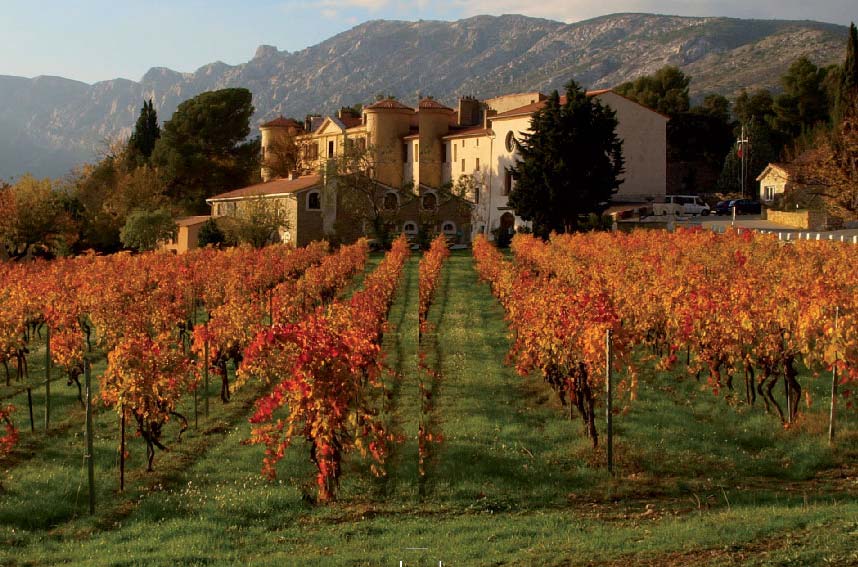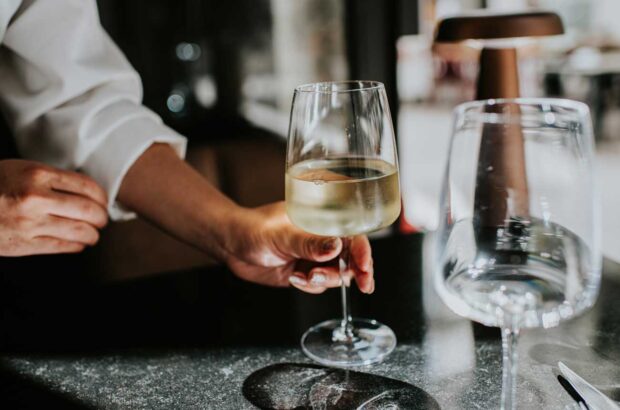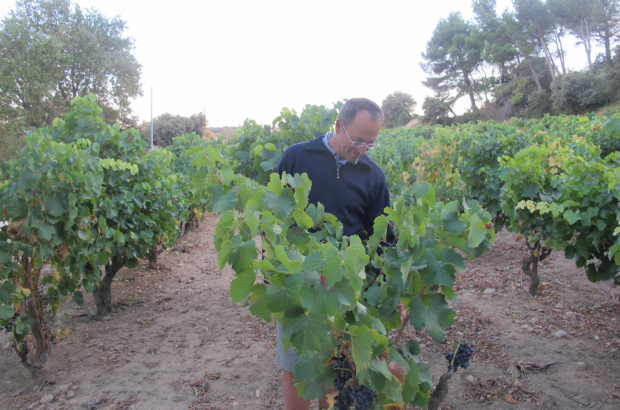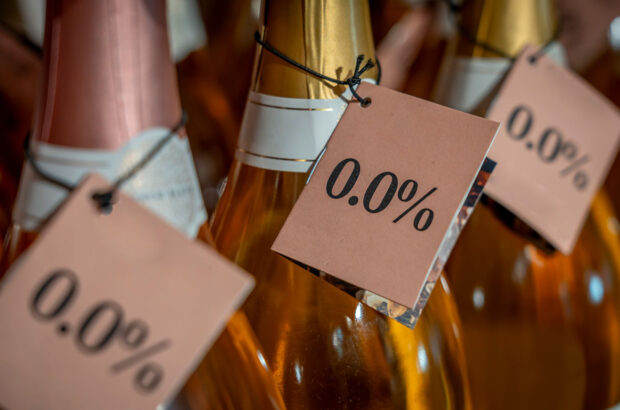Colonel Gilles Normand is not the most likely of vineyard directors.
For a start, he is wearing his full military uniform when I meet him, decorated with row upon row of medals and insignia.
It takes him 10 minutes just to talk me through them – from the Légion d’Honneur to the national order of merit to the cross of military valour. There’s one denoting the recognition of the French nation for almost 40 years of service, another from the Sovereign Military Order of Malta.
There’s even one for taking part in the Libyan Revolution, giving a hint that Colonel Normand has a streak of the adventurer about him.
Running a vineyard seems a little tame in comparison – at least until you realise that Domaine Capitaine Danjou is almost certainly the only vineyard worldwide where he could be surrounded by former servicemen, some of whom he has led into battle himself, and all of whom must make for lively conversation over the pruning secateurs.
This is the home estate of the French Foreign Legion, that infamous fighting unit open to all nationalities that have been immortalised in more than 100 films from Laurel and Hardy to Claude van Damme’s Légionnaire.
It counts today around 10,000 soldiers from 120 countries, with recent deployments to Afghanistan, Mali, Burkina Faso, the Lebanon, Iraq and the Ivory Coast.
Even today it comprises around 10% of the French military force and is still so popular that recruitment offices receive eight requests for every place.
The exact makeup of applicants changes depending on the geopolitical situation worldwide. Nepal and Brazil are providing plenty of potential recruits right now, whereas after the Falklands War there were a large number of British applicants.
It is also the only branch of the French military to have its own vineyard – in fact, as far as I know, the only branch of any military globally to make its own wine from its own grapes.
Vineyard workers comprise former Légionnaire soldiers who now live full-time on a property that is also known as the l’Institution des Invalides de la Légion Étrangère (IILE), founded to look after wounded veterans, many of whom are unwilling or unable to return to their home countries.

Tasting the wines. Credit: Jane Anson
How it came about
They certainly picked a beautiful spot, in the foothills of the Ste-Victoire mountains near Aix-en-Provence.
It was originally given to the Legion in the 1950s by the French government, at the height of the Indochina War and the growing Algerian conflict. There were 36,000 members of the French Foreign Legion at the time, and it became increasingly clear that wounded veterans needed somewhere to go.
It’s essentially a service much like that for the Chelsea Pensioners in London, but the inmates are a little rowdier, and almost certainly have more tattoos.
‘Today our pénsionnaires are often not injured in battle, but wounded by life’, says Colonel Normand, taking me through the almost 100 ex-Légionnaires that live at the estate. The youngest is 35, the oldest (‘of Dutch origin’, he says mysteriously) is 93. The average age overall is 68.
‘All have served with the Foreign Legion, and all received their certificate of good conduct. Those are the only criteria that you need to join – along with being single – and male, because women are still not allowed in the Foreign Legion.
‘They are here because we believe in the motto of the Foreign Legion,’ he adds, ‘that “tu n’abandonnes jamais les tiens, ni au combat, ni dans la vie (‘you never abandon your own, in combat nor in life’). You’ll see the same words on the back label of every bottle of wine they produce.
Besides being given food and board – for an average cost of around €500 per month, according to ability to pay – the pénsionnaires are given work on the estate.
Although the French state gifted the land, it is entirely self-funded today, and the vineyard comprises the bulk of its income – with shortfalls made up by donations and bequests.
And they are offered what amounts to a mix of training and occupational therapy – either through learning bookbinding or ceramics, or by taking on gardening duty, cooking duty, or working in the vineyard. And of the four permanent salaried staff in the vineyard, three are ex-Légionnaires.
From wheat to vines
Back in the 1950s, the estate came with 12ha of vines, with the bulk of the 220ha of land given over to wheat. When it became clear that cereal production was losing money, the vineyard was increased in size to today’s 40ha, producing around 175,000 bottles per year, with a further 25,000 added from wine bought through the local cooperative cellar.
Until fairly recently, the output comprised hearty but rustic reds, but as the need to make a financially viable business increased, they enlisted two Bordeaux winemakers as both reservists and volunteer wine consultants.
This is how I met up with the Colonel, at Château Coutet, the home estate of Philippe Baly and an estate that has welcomed numerous Légionnaires for training in viticulture.
Baly has been working with Domaine Capitaine Danjou since 2006, and he, in turn, asked Bertrand Léon to join him in the role. I know Léon better as the owner of the brilliant Château les Trois Croix in Fronsac, and as a consultant for, among others, Château d’Esclans in Provence.
By coincidence, his father, Patrick Léon, first began working with Château d’Esclans’s Sacha Lichine there also in 2006. But, it turns out he also did his military service with the marine corps, surely the only other military unit to approach the Légionnaires in capturing the public imagination.
The relationship between Baly and the Foreign Legion goes back to the 1970s and a chance meeting with an ex-officer that developed into a longstanding family friendship. Both men also clearly enjoy the challenge of working with such an unusual group of winemakers.
‘I liked the idea of helping ex-Légionnaires who had served France,’ says Bertrand Léon. ‘When I arrived at the estate I was impressed by the solidarity between the generations. It’s rewarding work for all of us.’
‘It wasn’t hard to see the possibilities of the magnificent terroir when we arrived here,’ says Baly. ‘It was the vineyard that needed the work, pulling up and replanting certain sections, adapting the rootstocks and matching soil to grape variety, and working with the cooperative cellar to oversee vinification before bringing the wines back to age at the estate.’
At harvest time up to 170 volunteers come for picking, almost all ex-Légionnaires who prove extremely loyal, not to mention good customers for the final wine. Provisioning officers buy the wine for Foreign Legion messes around the world, and a percentage of sales are then also recycled back into funding.
An onsite boutique and restaurant at the estate sells almost half of the output to visiting tourists – something that has been hit hard amid the Covid-19 crisis this year.
As for the wines themselves, the white and rosé are very clearly made by expert hands, offering exceptional value for money. The reds, particularly the main bottling, major on hearty and unfussy rather than overly polished, but it’s hard to criticise them for that.
‘They made tiny amounts of white and rosé back in 2006,’ says Léon, acknowledging the expectations. ‘We rebalanced the output a little, but not too much because even if Provence is known for rosé, the Legion is known for its sturdy reds, a reflection of the fighting force that is also their main customer.’
You can purchase the wines and other products from www.legion-boutique.com/







